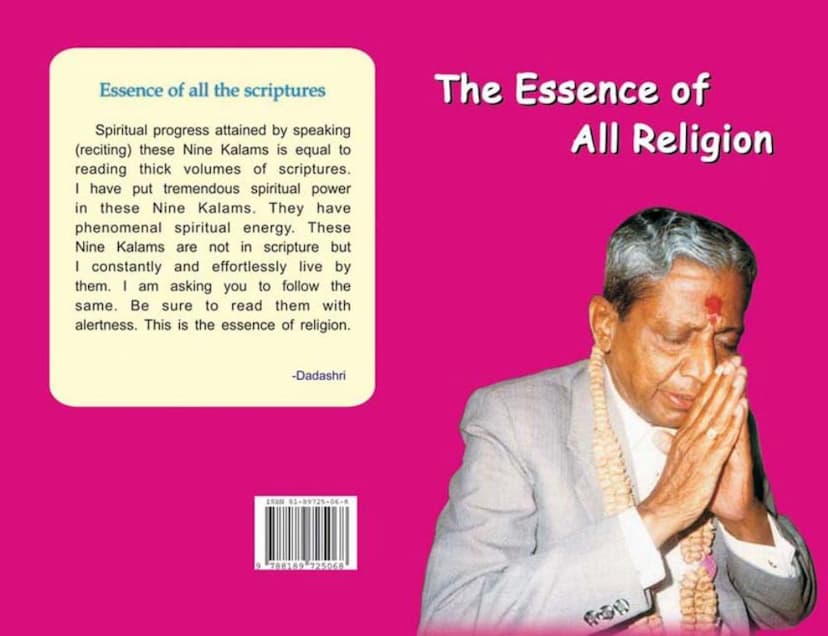Essence Of All Religion
Added to library: September 1, 2025

Summary
The book "Essence of All Religion" by Dada Bhagwan, published by Dada Bhagwan Foundation, presents a profound distillation of spiritual teachings, focusing on achieving inner peace and liberation through a set of nine powerful "kalams" (utterances or prayers). The core philosophy emphasizes that true spiritual progress and the essence of all religions lie not in extensive scriptural study, but in the practical application of these nine transformative intentions (bhavnas).
Key Themes and Teachings:
- The Power of Bhavna (Inner Intent): The book posits that all actions and their results stem from inner intentions. To change one's life and achieve spiritual progress, one must change their fundamental bhavna. The nine kalams are presented as the tools to achieve this fundamental change.
- The Nine Kalams as the Essence of Religion: Dada Bhagwan states that these nine kalams contain the essence of all scriptures. Their recitation, done with alertness and sincerity, instills tremendous spiritual power and energy, leading to spiritual progress equivalent to reading vast volumes of scriptures.
- "I Don't Know Anything" and Ultimate Humility: A central tenet is the embrace of "ultimate humility" and the awareness of "I don't know anything." This detachment from ego and self-knowledge opens the door to universal oneness.
- Overcoming Obstacles: The nine kalams are described as a "medicine to remove all obstacles in life." They help transform internal causes, leading to positive external results.
- Akram Vignan (Step-less Science): The teachings are rooted in Akram Vignan, a direct and effortless path to Self-Realization. Dada Bhagwan himself attained Self-Realization spontaneously in 1958, becoming a living instrument for the world's salvation. This path, also known as the "elevator path," is a shortcut to the bliss of the Self.
- The Gnani Purush: The text emphasizes the importance of meeting a Gnani Purush (an Enlightened One) to acquire the knowledge of the Self (Atmagnan). Dadashri (Ambalal M. Patel) is presented as such a Gnani Purush, who imparts this knowledge through a scientific process called Gnan Vidhi.
- Syaadvaad Vani, Vartan, Mannan (Speech, Action, Thoughts Accepted by All): This is a crucial concept within the kalams. It means interacting with others in a way that respects their viewpoints and does not hurt their ego. This approach fosters harmony and understanding, even with those who hold different beliefs or engage in negative actions.
- Respect for All Religions: The teachings advocate for respecting the foundation of every religion, understanding that different paths lead to the same ultimate truth from various perspectives.
- Avoiding Criticism, Offense, and Insult (Avarnavaad, Apaaraadh, Avinay): The kalams implore the seeker to avoid speaking ill, offending, or insulting anyone, including religious figures, whether they are present or absent, living or dead. Special emphasis is placed on avoiding negative speech about the deceased, as it creates karmic liabilities.
- Control of Desires and Temptations: The kalams address the need to control excessive desires, particularly those related to food (lubhdapanoo) and sexual impulses (vishay-vikaar). The concept of a "samrassi" (balanced) diet is also introduced.
- The Role of "Asking for Strength": A unique aspect of these teachings is that one does not need to do anything to achieve these spiritual advancements. Instead, one must simply ask for strength from "Dada Bhagwan" (the Lord within). This act of asking for strength is the cause, and the results will manifest naturally.
- Pratikraman (Divine Apology): The text explains the importance of immediate repentance and seeking forgiveness for any mistakes made, especially when one's ego has hurt another. This process of pratikraman helps cleanse past karmic accounts.
- Bhaav vs. Bhaavna: For those who have received Gnan (Mahatmas), their intentions are seen as "discharge," while for others, they are "charge." Both forms of intentions, when pure and aligned with the Gnani's blueprint, lead to spiritual progress.
- Breaking Roonanubandha (Karmic Ties): The nine kalams are instrumental in breaking the karmic ties formed with others over lifetimes, which are obstacles to liberation.
- Future Life and the "Seeds of Bhavna": The benefits of reciting these kalams may not be fully realized in this life, but they are described as planting seeds for a better future life, free from obstacles.
In essence, "Essence of All Religion" provides a practical and scientifically grounded approach to spiritual awakening, emphasizing the transformation of inner intent through sincere prayer and the guidance of a Gnani Purush. It offers a direct path to liberation by focusing on humility, non-violence in thought, word, and deed, and a profound understanding of cause and effect.